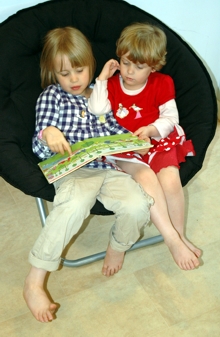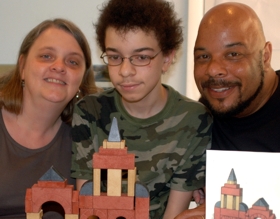Programs for Children with
Pervasive Developmental Disorder
 Pervasive Developmental Disorder - not otherwise specified (PDD-NOS) is one of the Autism Spectrum Disorders. The term is used to describe individuals who do not fully meet the criteria for autism or Asperger syndrome.
Pervasive Developmental Disorder - not otherwise specified (PDD-NOS) is one of the Autism Spectrum Disorders. The term is used to describe individuals who do not fully meet the criteria for autism or Asperger syndrome.
Children are likely to be diagnosed with PDD-NOS if they fit into one of the following profiles:
- They are functioning highly in many areas of development and may resemble people with Asperger syndrome, but they have some language delays or mild cognitive impairment (the Asperger diagnosis requires no speech or cognitive delay).
- They resemble children with autism but the onset of autistic symptoms occurred at a later age than is usual for autism, or they did not meet the criteria for autism in some specific way.
- They have characteristics of autism, but they display fewer stereotyped and repetitive behaviors.
Special Treatment Needs of Children with PDD-NOS
Within the professional community, there is general consensus that children with PDD-NOS benefit from early intervention and special education services. However, one child with PDD-NOS may have completely different strengths and challenges than another child with the same diagnosis. A form of treatment that is highly effective for one child may be completely unnecessary and ineffective for another. As a result, the treatments and interventions that work best will be highly individualized, based on the information gathered from a thorough assessment of the child.
The assessment must examine a wide variety of factors including behavioral history, current symptoms, communication patterns, social competence and neuropsychological functioning.
There has recently been a strong and needed emphasis on early intervention in the local community for young children diagnosed PDD-NOS. But often children who are five or older do not continue to receive the kind of individualized programs that would benefit them tremendously. Parents can compensate for this by creating a part-time home program.
The Growing Minds Approach to PDD-NOS
In our experience, children diagnosed with PDD-NOS often have neurological difficulties, which remain undetected. These children tend to work extremely hard to compensate for these issues. They often do not get appropriate services because their diagnosis is not well understood and they are not thought to require the kind of services necessary for a child with autism (an incorrect assumption.)
 Careful assessment of the child’s skills and the areas of difficulty is critical for children with PDD-NOS. Effective target setting and support to meet those targets, including help for any unaddressed neurological issues, will dramatically impact the future of these children.
Careful assessment of the child’s skills and the areas of difficulty is critical for children with PDD-NOS. Effective target setting and support to meet those targets, including help for any unaddressed neurological issues, will dramatically impact the future of these children.
For older children (over age 5) with PDD-NOS, we often recommend that school be supplemented with help from an extremely effective, part-time home program. We design these home programs and train parents to implement them. The programs consist of some structured teaching sessions as well as making use of the child’s daily activities, interactions with family members and play time with peers to help the child meet developmental targets, improve social and communication skills and reduce unwanted behavior.
Based on individual assessment, our programs are designed to accomplish specific targets necessary for the child to improve social, communication, cognitive, academic and play skills that are not being addressed sufficiently at school, with the aim of closing any developmental gaps that exist. We are available to oversee the child’s progress and continue to modify the program to keep up with the child’s growth.
Getting Started
We offer a 4-session, distance Consultation Series (by internet and phone) for parents interested in experiencing our services to decide if we are a good fit for your needs.
Our Comprehensive PDD-NOS Program begins with in-person training (4 days) for parents, their child and any support people the parents may wish to include. They continue with 6 months of distance follow up and training by phone and video conferencing. While there are strong advantages to conducting the initial in-person training at our Broomfield, Colorado offices, we have limited openings for families whose circumstances make it necessary to hold the training in your home. For children three and under, an initial 3-day in-person training is usually sufficient. Children ages four and five require a more comprehensive approach and so we strongly recommend an initial four-day, in-person training.
We also offer training entirely at a distance (Internet and phone) for situations in which the family’s needs can be sufficiently addressed without in-person services. This tends to work best when the parents have already had previous training and experience in working with their child at home.
Register Now